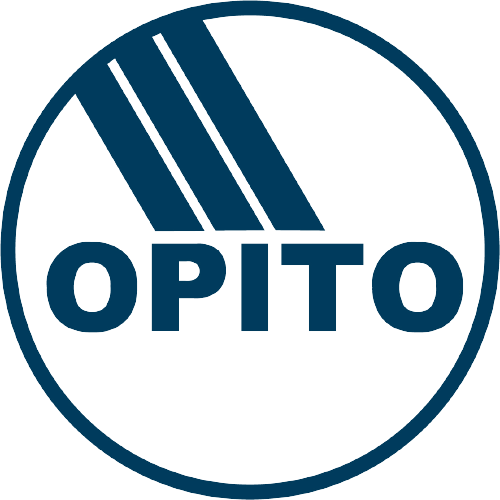NEWSDelegates in Aberdeen trial new groundbreaking safety initiative
26/04/2012
The latest IMIST (International Minimum Industry Safety Training) information lunch took place at Atlas’ global headquarters in Aberdeen on the 26th April. The team at Atlas were delighted to welcome representatives from leading oil & gas companies and training providers who have already helped set the safety standard in the UKCS through MIST UK. Delegates were given the opportunity to trial the first global standard in safety for the Oil & Gas Industry and contribute to an open discussion on IMIST. Atlas was also delighted to welcome Larraine Boorman, the new Managing Director of OPITO who gave an update on the future of MIST UK. IMIST was developed to provide a new global standard for Health and Safety training, which will provide a comprehensive and consistent level of training across the world and enhance work force safety and compliance. IMIST- the new standard in safety training - is being rolled out across 30 countries worldwide throughout Asia, Africa and the North America over the next two years. If you would like to find out when the next IMIST event in your region takes place, contact info@IMIST-Online.com.
Growing the global footprint of IMIST
08/03/2012
Atlas has expanded the global footprint of facilities capable of delivering the groundbreaking new global training initiative for the oil and gas industry with the approval of the first centre’s in northern Europe, demonstrating the growing number of Oil and Gas regions around the world who have now facilities to invigilate the International Minimum Industry Safety Training (IMIST) - the first global standard in safety. It brings the total number of invigilation centre’s approved to deliver IMIST around the world to 28, with facilities spanning Australia, Thailand, Singapore and the Philippines as well as the United Arab Emirates, Qatar, North America, Nigeria, Norway and Russia among others. Developed by global oil and gas training standards body OPITO International, IMIST brings for the first time a standardised level of basic safety training to an estimated 1.5million oil and gas workers worldwide. The training assesses basic safety knowledge in nine subject areas including risk assessment, asset integrity, the use of hazardous substances, working at height and mechanical lifting among other subjects. IMIST online, which was launched in the Middle East in July 2011, is delivered in partnership with Atlas via approved invigilation centres only. Companies can use any of the approved Invigilation Centres worldwide to train their employees with the confidence that it will be delivered professionally and accepted by employers all over the world. It will also reduce the burden of training costs for companies with both new entrants and experienced workers able to undergo a full range of mandatory and voluntary health and safety courses under one roof. IMIST is being rolled out across 30 countries worldwide throughout Asia, Africa and the North America over the next two years. It will be delivered via e-learning and tailored to meet each region’s specific workforce, language and geographic needs.
ATEC first to deliver groundbreaking training initiative in North America
01/03/2012
Atec Training and Certification Services has become the first company in North America to gain approval to deliver a groundbreaking new global training initiative for the oil and gas industry in this region. The training provider’s Houston centre is the first to meet the stringent criteria set by learning and skills specialist Atlas to invigilate the International Minimum Industry Safety Training (IMIST) e-learning programme, a global initiative developed to drastically improve safety standards for the offshore workforce worldwide. Developed by global oil and gas training standards body OPITO International, IMIST online is delivered in partnership with Atlas via approved invigilation centres only. The Atec Training Centre has the capacity to offer training to around 500 oil workers each month. With an estimated 244,000 people in the North America currently employed in exploration and production activities, the centre is ready to be used by companies across the region. IMIST brings for the first time a standardised level of basic safety training to an estimated 1.5million oil and gas workers worldwide. The training, which was launched in the Middle East in July and is being rolled out across 30 countries, assesses basic safety knowledge in nine subject areas including risk assessment, asset integrity, the use of hazardous substances, working at height and mechanical lifting among other subjects. By gaining Atlas approval to deliver the course, workers using the Atec Training Centre will have their IMIST training accepted by employers all over the world. It will also reduce the burden of training costs for companies with both new entrants and experienced workers able to undergo a full range of mandatory and voluntary health and safety courses under one roof. Tommy Sutherland, Managing Director of Atec, said: “We are delighted to be the first centre in the US to offer this groundbreaking safety training. IMIST is the only truly global standard that will provide a consistent level of safety knowledge to industry workers, totally transferrable for our transient workforce, whatever region they are working in. Atlas’ approval provides independent and world-wide recognition of the quality of our delivery. “Our Centre is well positioned in this region, with our facility in Houston which can provide companies operating in North America with a time and cost-effective way of accessing the new IMIST course, ensuring the workforce is best equipped to operate in the safest and most efficient way possible.” John Rowley, chief executive of Atlas said the accreditation was a good step towards promoting the roll out of this global minimum safety standard to industry in this region. “IMIST is an important element of assuring a common standard of competency and this accreditation is a clear step forward towards achieving a step-change in the health and safety culture globally and meeting the target of reducing risk and making sure workers can return home safe at the end of each day.” He added: “There has been a great deal of interest from training providers all over the world who want to deliver this groundbreaking global safety standard in their centres, with 26 now registered and spread across most oil and gas regions. Using an invigilated environment ensures the online course is being delivered at the high level the industry demands and we are delighted that Atec has become the first centre to gain approval in this key region.” IMIST is now available in 5 languages - Arabic, Bahasa Malaysian, UK and American English, Hindi and coming soon in Thai, French and Bahasa Indonesian.
The Challenge of a Common Standard
21/02/2012
THE appetite for greater consistency and a common global standard for basic safety training in the Oil and Gas Industry is growing. Since OPITO, the global oil and gas training standards body, working in partnership with specialist learning and knowledge provider Atlas, launched International Minimum Industry Safety Training (IMIST) in July 2011, a common theme has emerged across companies of all shapes and sizes when it comes to tackling the issue of basic health and safety training for their workforce. National and international oil companies alike cite the need for a consistent level of globally recognised training. Interestingly the challenges of introducing and delivering this type of training – no matter the scale of the company involved or in which corner of the globe they operate – also remain broadly the same. More than 500 demonstrations of IMIST are currently underway across Europe, the Middle East, Asia Pacific and the US. OPITO IMIST brings, for the first time, a standardised level of basic safety training to an estimated 1.5million people employed in exploration and production activities worldwide. Delivered online through an approved e-learning programme, IMIST has been developed by industry for industry to provide a comprehensive and consistent level of training across the world to enhance workforce safety and compliance. Designed to enable existing workers to demonstrate their knowledge and awareness of the basic safety standards necessary to reduce risks and incidents, the course contains nine modules ranging from an introduction to the hazardous environment, working safely and understanding the risk assessment process to tasks that require a permit to work, personal responsibility in maintaining asset integrity and the knowledge and processes of working at height. Atlas and OPITO have hosted a series of briefings across Middle East, Asia Pacific and the US which have seen hundreds of delegates trial the programme. A further 100 trials are currently being undertaken by oil and gas companies around the globe. “The questions that we are hearing are by and large the same, no matter which geographic region businesses operate in,” said Andy Imrie, Executive Director at Atlas. The need for a consistent level of basic safety training is globally recognised, the challenge really lies around delivering IMIST to a diverse cross section of nationalities, abilities and locations whilst ensuring the same high standard is met. “Delivering IMIST online through e-learning meets this challenge by offering industry a consistent approach to the delivery of this HSE programme, it ensures that the training standard can be met across multiple geographies and cultures. “This method of training is perfectly suited to large, dispersed organisations as it accommodates multiple trainees with a wide range of learning styles, preferences and needs.” EngagementFundamental to the success of any large-scale training programme is the need to engage the audience – whatever their level of experience. “One of the key questions we are asked is how one course can adequately assess the needs of workers with several years’ knowledge and experience under their belts and those who are relatively new to the industry,” explained Imrie. “We developed the technology underpinning IMIST to allow workers with a solid understanding of basic safety to progress very quickly through the course. While the time required to complete it is reduced, the content and standard of competency required doesn’t change.” Trainees initially work through a bank of 61 pre-assessment questions which are mapped to the OPITO IMIST standard. This process identifies knowledge gaps and builds a user specific course from the entire IMIST content, based only on these gaps. Each element of content will be followed by a set of assessment questions and as such the course will re-build itself until the trainee has correctly answered all the learning objectives. Summative questions are also aligned to course learning objectives. “Critically, this approach has created an e-learning environment that is more likely to keep the participant engaged, informed and interested in a key area of training. It has reduced what could have been up to 13 hours of classroom training to two to three hours of interesting and relevant e-learning,” said Imrie. Navigation and LiteracyWhere training needs to be delivered to thousands of people at hundreds of locations across scores of different cultures, how can you ensure comprehension of what is required across a workforce with varied literacy levels? “Understanding is key. There is little point to introducing a common standard if it is not accessible to the whole of the oil and gas population,” said Imrie. “National Oil Companies in particular have issues with literacy standards among their workforce so IMIST has been designed in a visual format so it is easy to navigate and is adaptable to those with low computer skills. “We have also embarked on a programme of translations. With an estimated 221 million Arabic speakers in 57 different countries worldwide, this was the first logical starting point in terms of translating IMIST from English and of increasing accessibility by bringing it to a wider pool of oil and gas workers.” Additional translations have now been carried out and IMIST is now available in Bahasa Malay, Hindi, UK and American English. Atlas expects to have Thai, Bahasa Indonesian, French, Spanish, and Portuguese versions coming out soon. Transferability and ConsistencyOil and gas has one of the largest transient workforces of any industry in the world. The task of educating and ensuring behavioural safety ownership in this type of workforce is a challenging and difficult one. “A global standard provides companies with the assurance they need that the people they have working for them, whether directly or via contractor, meet the same basic level of safety and competency to avoid risk. “IMIST can only be undertaken in an invigilated environment at approved training centres so there is the safety net of knowing the required standard is being met. The footprint of approved centres currently stretches from the UAE, Qatar and Nigeria to Thailand, Singapore, Australia, Norway, the US and Russia and continues to grow. InvestmentSafety is paramount across the oil and gas community with companies investing millions of dollars every year in a multitude of training courses. Among the frequently asked questions is why organisations should commit to IMIST if their own internal training meets a higher standard? “A great many organisations have their own induction programmes or ‘golden rules’ when it comes to safety, however these can be site specific and not easily transferable. IMIST was designed to complement rather than replace these initiatives and provide the industry with a common best-practice standard for basic safety training recognised by every employer around the globe. This removes the need for operating staff and contractors to continually repeat company training programmes depending on which site or platform they are posted. We have heard that some workers in a year might go through a manual handling course four or five times, with a huge cost of time and resource to industry and also with varying levels of quality of the course. “The price is fixed at $99 (USD) per licence no matter where in the world you are and this includes OPITO accreditation fee and registration onto the Vantage system. In terms of return on investment however, the benefits are immeasurable.” IMIST will be rolled out across 30 countries worldwide over the next 18 months with a programme of industry briefings scheduled for the US, Australia and Africa amongst others. “This is very much an ongoing process with feedback playing an integral part in ensuring delivery of IMIST is fit for purpose and meets the needs of the industry,” added Imrie.
OPITO’s IMIST Set To Become Safety Standard For Gulf of Mexico and Globally
14/02/2012
Houston – Feb. 14, 2012 – No longer a best practice, but rather a moral imperative, global oil and gas standards body, OPITO, sees a continuing demand within the Gulf of Mexico oil and gas community to establish a global safety standard. For the first time, OPITO, with the oil and gas industry, has developed an online global standardized level of basic safety training which will reach an estimated 1.5 million people employed in exploration and production activities of oil and gas worldwide. Atlas, the leading international learning and skills provider, has worked in partnership with OPITO to develop the online technology and deliver IMIST globally. IMIST online is being rolled out across 30 countries worldwide including Abu Dhabi, Iraq, Malaysia and the United States over the next two years. Together, OPITO and Atlas have successfully trained more than 50,000 oil and gas workers in the UKCS since 2009 to the MIST United Kingdom standard. “Our objective for IMIST is to increase the level of safety awareness, reduce operational risk and the number of safety related incidents,” said Albert Skiba, OPITO’s vice president of the Gulf of Mexico. “IMIST represents a major step forward by the oil and gas industry to introduce a global safety standard relevant to USA workers as well as those working in the Middle East, Persian Gulf, West Africa and Southeast Asia .” OPITO contends that training people consistently to the same level will bring significant safety improvements in the Gulf of Mexico and internationally. Additionally IMIST will allow greater flexibility in overseas deployment as it becomes the standard for safety training on a global basis with no need to duplicate and repeat training. IMIST online is an e-learning program, which ensures, in a consistent and cost-effective manner, that anyone working in the oil and gas industry has the appropriate training, skills, and competency to minimize safety hazards and risks. The course, now available in four languages assesses basic safety knowledge in nine subject areas including risk assessment, asset integrity, the use of hazardous substances, working at height and mechanical lifting among other subjects. John Rowley, chief executive officer of Atlas said: “A global standard provides companies with the assurance they need that the people they have working for them, whether directly or via contractor, meet the same basic level of safety and competency to avoid risk.” Rowley added, “We developed the technology underpinning IMIST to allow workers with a solid understanding of basic safety to progress very quickly through the course. While the time required completing it is reduced, the content and standard of competency required does not change. This approach has created an e-learning environment that is more likely to keep the participant engaged, informed and interested in a key area of training, raising the bar on safety standards in the worldwide oil and gas industry.” A not-for-profit industry body, OPITO is committed to improving safety and reducing risk for people, assets and companies in one of the most hazardous working environments. The organization works with governments, national oil companies, multi-nationals and contractors to provide independent advice and guidance on effective management of workforce skills development, emergency response, occupational standards, qualifications and quality assurance of training delivery. Its world class training network spans 32 countries with more than 200,000 people each year training to OPITO’s best-practice standards. The U.S. briefing of IMIST will take place, Valentine’s Day, Feb. 14, 2012, at Hotel ZaZa in Houston . Around 50 senior representatives from the leading national and international oil companies will attend the briefing to hear how the IMIST standard will transform the industry by ensuring workers have a common standard of safety knowledge and training to understand and avoid hazards and risks.
Atlas Appoints New Account Director for Asia Pacific Region as Business Continues to Expand
01/12/2011

International learning and skills specialist Atlas has strengthened its presence in Asia Pacific with the appointment of Ian Noronha as new Account Director to spearhead sales in the region. Noronha will drive growth with new and existing clients and oversee the company’s work with key multinational and state-owned companies in all safety-critical industries across Asia Pacific. Based in Atlas’ representative office in Kuala Lumpur, Noronha will also work with the organisation’s UK operation to develop new products and services tailored to meet the needs of the regional market. Atlas has been active in Asia Pacific for more than five years, recently winning large contracts with ConocoPhillips in Australia to support their LNG activity and also establishing a network of Invigilation Centres to deliver OPITO’s International Minimum Industry Safety Training (IMIST) across the region. Atlas’ chief executive officer John Rowley said: “Asia Pacific is an important market for us and we have established a solid platform from which to grow. We are fortunate to have someone of Ian’s calibre join the team and are confident his experience will help us to develop new opportunities in the region for our expansion across the business internationally.” Noronha’s appointment further strengthens the company’s drive to become the global leader in innovative learning, compliance and competency workforce solutions. Atlas provides services to more than 750 companies worldwide and closed out last year reporting significant, multi-million dollar wins—most notably ExxonMobil. In the last two years, employee numbers have nearly doubled to 75 personnel and exports account for more than 45 percent of sales. “It’s an exciting time to be joining Atlas at such an important stage in its journey. Atlas is an energetic and innovative company with great vision and passion, not just for its people, its clients and its business but for the safety critical industries it works in,” said Noronha. “Most importantly, it has the right people, the right skills and the drive and enthusiasm to succeed, all essential components in achieving its global aspirations”, he continues. A graduate of the University of Flinders, South Australia, Noronha holds a bachelor of science with a major in computing and a master in business administration from the University of Hull. Noronha brings to this post valuable experience of the training market in this region, having spent more than 13 years in this sector working as Country Director (SEA) for the City & Guilds and Business Relationship Manager for Prometric B.V. based in Kuala Lumpur.
IMIST’s global footprint grows as first training facility opens in Iraq
01/12/2011
International learning and skills specialist Atlas has expanded the global footprint of facilities capable of delivering a groundbreaking new global training initiative for the oil and gas industry with the approval of the first centre in Iraq. The accreditation of the Al Delma facility in Basra City demonstrates Iraq’s commitment to developing its energy industry and creating a workforce trained to the globally recognised basic safety standard, IMIST online It brings the total number of invigilation centre’s approved to deliver International Minimum Industry Safety Training (IMIST) around the world to 16, with facilities spanning Australia, Thailand, Singapore and the Philippines as well as the United Arab Emirates, Qatar, Nigeria and Russia among others. The Al Delma centre will be capable of delivering the programme to up to 250 people every day. Bilal Mahmood, CEO of Al Delma said: “Long-term underinvestment in the development of our oil and gas personnel has meant considerable training is needed if we are to accomplish the goal of a safe and skilled workforce for the future. “We have built our reputation on being quick, smart and reliable and we are delighted to be the first to gain approval to deliver this new international training and be a model to others in the country as we are one of the biggest training centres.” Developed by global oil and gas training standards body OPITO International, IMIST brings for the first time a standardised level of basic safety training to an estimated 1.5million oil and gas workers worldwide. The training assesses basic safety knowledge in nine subject areas including risk assessment, asset integrity, the use of hazardous substances, working at height and mechanical lifting among other subjects. IMIST online, which was launched in the Middle East in July 2011, is delivered in partnership with Atlas via approved invigilation centres only. By gaining Atlas approval to deliver the course, workers using the Al Delma centre will have their IMIST training accepted by employers all over the world. It will also reduce the burden of training costs for companies with both new entrants and experienced workers able to undergo a full range of mandatory and voluntary health and safety courses under one roof. Atlas chief executive John Rowley said: “This is a significant step forward for the oil and gas workforce in Iraq in terms of creating a safe, sustainable and profitable oil and gas industry for the country. “It is also a major milestone in the adoption of a common industry standard for basic safety and competency in oil and gas around the world. The support which has been shown for this initiative is evident in the rapidly increasing footprint of centres which now spans across all four corners of the globe and is testament to the industry’s desire to improve safety at all levels.” IMIST is being rolled out across 30 countries worldwide throughout Asia, Africa and the North America over the next two years. It will be delivered via e-learning and tailored to meet each region’s specific workforce, language and geographic needs.
IMIST is now available in 5 languages
30/11/2011
IMIST is now available in Arabic, Malaysian, UK and American English languages and will be available soon in Hindi. Please view our IMIST videos in Arabic, Malay or English on Atlas Knowledge TV to find out more about the online International Minimum Industry Safety Training. If you would like to trial a licence for any of these language versions, please email info@IMIST-online.com for instant access to the IMIST course. For easy access to all the latest news, events and updates regarding the first global standard in safety, please follow IMIST blog.
Research unveiled during OPITO Safety Conference
23/11/2011
Atlas was among the high profile audience who took part in OPITO’s flagship Safety and Competency Conference (OSCC) in Abu Dhabi in November. The event, which Atlas sponsored, attracted registrations from around 300 delegates spanning the international and national oil and gas community with attendees from as far afield as Aberdeen, Azerbaijan and Bazra to Cairo, Japan, Indonesia and Texas travelling to the second annual conference. OSCC 2011 focused on the theme of Competence vs Compliance – addressing how the industry ensures a competent workforce that significantly improves safety rather than ticking the necessary boxes. Research commissioned by OPITO and conducted by the Robert Gordon University revealed that an improved focus on competence is required if the oil and gas industry is to deliver a step-change in safety skills and performance with over 65% of respondents believing that the current focus on compliance in companies could lead to complacency. The findings reveal a clear realisation among oil and gas companies around the world that being compliant is not enough to improve workforce safety and skills. OSCC saw Lord Cullen, author of the Cullen Report into the Piper Alpha tragedy, deliver the keynote address on the view of the inquirer into major incidents. Atlas also showcased International Minimum Industry Safety Standards (IMIST) during the event.
IMIST promo videos now available in Arabic and Malay
22/11/2011
Atlas has launched a series of promotional videos which are now available to view on Atlas Knowledge TV in Arabic and Malay. Originally developed in UK and American English, the film provides a short and informative video on how the International Minimum Industry Training Standard (IMIST) initiative was developed to drastically improve safety standards for the global offshore workforce. It will ensure 1.5million workers engaged in exploration and production activities worldwide have the necessary safety knowledge and training to understand and avoid hazards and risks. The video is due to be translated into Hindi early in the New Year, supporting the global roll out of IMIST across 30 countries over the next 18 months.
Atlas presented IMIST at the OPITO Safety and Competence Conference (OSCC) 2011
22/11/2011
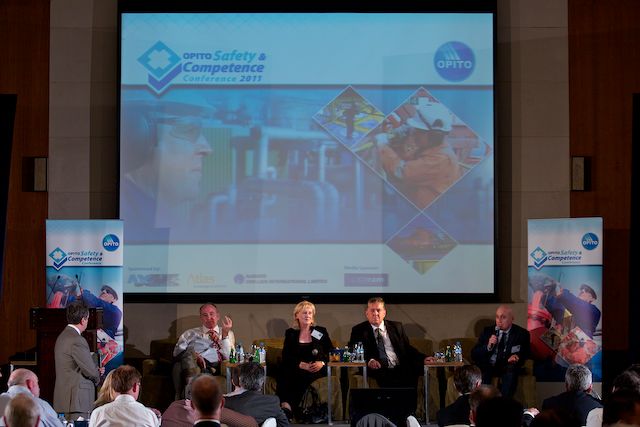

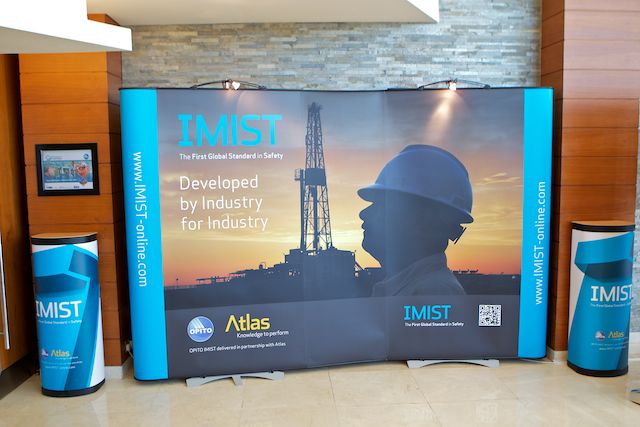

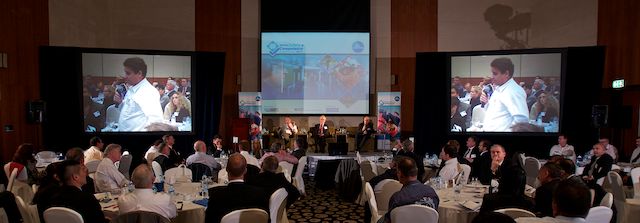




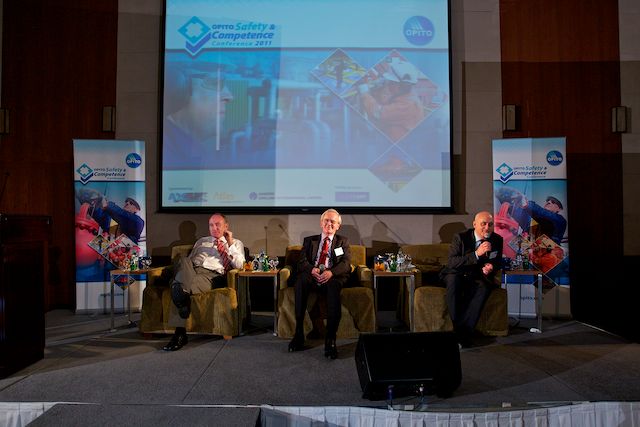
On Tuesday, 22 November 2011 at the Rotana Hotel, Yas Island over 300 delegates responsible for safety, competence and workforce development within their organisation attended OPITO’s second safety conference in Abu Dhabi. This year’s focus was on global safety and competency in the oil and gas industry, providing a forum for improving standards of safety and competency in the global workplace. Atlas was delighted to be a main sponsor of this event and took the opportunity to present IMIST Online at an exhibition stand in the foyer of the hotel. Following the conference Atlas held its annual golf outing at the Yas Island Golf course where 20 representatives from Atlas’ client and partner training organisation’s attended and enjoyed a round of golf on this first class course followed by lunch and prize giving.
QISC first to deliver groundbreaking training initiative in Qatar - November 2011
01/11/2011
Qatar’s leading training provider, QISC has become the first company in Qatar to gain approval to deliver a groundbreaking new global training initiative for the oil and gas industry. Qatar International Safety Centre (QISC), which provides innovative and tailored training solutions, has successfully met the criteria, set by International learning and skills specialist Atlas to invigilate the International Minimum Industry Safety Training (IMIST) e-learning programme, a global initiative developed to drastically improve safety standards for the offshore workforce worldwide. Developed by global oil and gas training standards body OPITO International, IMIST online is delivered in partnership with Atlas via approved invigilation centres only. QISC, has two state of the art facilities in Qatar custom-built to train up to 1,130 oil and gas workers each month. The company boasts the highest number of OPITO accreditations in the world delivered by trained experts accredited with the highest level of certifications. The centre trains a multi-skilled workforce from around the world, in various languages including, Arabic, English, Hindi, and Indian. IMIST brings for the first time a standardised level of basic safety training to an estimated 1.5million oil and gas workers worldwide. The training, which was launched in the Middle East in July, assesses basic safety knowledge in nine subject areas including risk assessment, asset integrity, the use of hazardous substances, working at height and mechanical lifting among other subjects. By gaining Atlas approval to deliver the course, workers using the QISC centre will have their IMIST training accepted by employers all over the world. It will also reduce the burden of training costs for companies with both new entrants and experienced workers able to undergo a full range of mandatory and voluntary health and safety courses under one roof. Andy Reid, business development manager at QISC, said: “As Qatar’s leading training provider, it was important for us to deliver the latest ground breaking safety standard to hit the market. Delivering IMIST courses helps us continue our goal of offering the highest quality training courses to the industry. Atlas’ approval provides independent and world-wide recognition of the quality of our delivery and we are delighted to be the first company in Qatar to meet the stringent criteria. “As we continue to be innovative and proactive to meet our customers’ needs we welcome any new training that contributes to the health and safety of our customers throughout the industry.” OPITO group chief executive David Doig said: “IMIST is an important element of assuring a common standard of competency and this accreditation is a clear step forward towards achieving a step-change in the health and safety culture across the industry.” Atlas chief executive John Rowley added: “We are delighted that QISC has become the first centre to gain approval in this key region. Using an invigilated environment to deliver IMIST ensures the online course is being delivered at the high level. There has been a great deal of interest from training providers who want to deliver this groundbreaking global safety standard in their centres around the world.” IMIST is being rolled out across 30 countries worldwide throughout Asia, Africa and the North America over the next two years. It will be delivered via e-learning and tailored to meet each region’s specific workforce, language and geographic needs.
Global safety initiative IMIST launched in Arabic - October 2011
01/10/2011
A LANDMARK training initiative developed to drastically improve safety standards for the global offshore workforce is now available in Arabic. The International Minimum Industry Training Standard (IMIST) will ensure 1.5million workers engaged in exploration and production activities worldwide have the necessary safety knowledge and training to understand and avoid hazards and risks. It is being rolled out across 30 countries worldwide throughout Asia, Africa and the United States over the next two years. A second translation, into Bahasa Malay, is due to be released in November 2011. IMIST has been developed by oil and gas training standards body OPITO and will be applied to every member of the current workforce and all new entrants to the industry. Delivered in partnership with Atlas via e-learning and tailored to meet each region’s specific workforce, language and geographic needs, the course assesses basic safety knowledge in nine subject areas including risk assessment, asset integrity, the use of hazardous substances, working at height and mechanical lifting among other subjects. John Rowley, chief executive officer of Atlas said: “Originally developed in UK and American English, IMIST provides the platform for increasing the performance of the national workforce whilst ensuring a standardised playing field in terms of safety and competency. “With an estimated 221 million Arabic speakers in 57 different countries worldwide, this move is the first step towards increasing its accessibility, bringing the benefits of IMIST to wider pool of oil and gas workers.”
Falck first to deliver groundbreaking training initiative in the Middle East - October 2011
01/10/2011
Falck Safety Services has become the first company in the Middle East to gain approval to deliver a groundbreaking new global training initiative for the oil and gas industry. The safety training provider’s Abu Dhabi centre is the first to meet the stringent criteria set by learning and skills specialist Atlas to invigilate the International Minimum Industry Safety Training (IMIST) e-learning programme, a global initiative developed to drastically improve safety standards for the offshore workforce worldwide. Developed by global oil and gas training standards body OPITO International, IMIST online is delivered in partnership with Atlas via approved invigilation centres only. The Falck centre, in Musaffah industrial city, has the capacity to offer training to around 1,300 oil workers each month. With an estimated 460,000 people in the Middle East currently employed in exploration and production activities, the centre is expected to be used by companies across the region. IMIST brings for the first time a standardised level of basic safety training to an estimated 1.5million oil and gas workers worldwide. The training, which was launched in the Middle East in July, assesses basic safety knowledge in nine subject areas including risk assessment, asset integrity, the use of hazardous substances, working at height and mechanical lifting among other subjects. By gaining Atlas approval to deliver the course, workers using the Falck centre will have their IMIST training accepted by employers all over the world. It will also reduce the burden of training costs for companies with both new entrants and experienced workers able to undergo a full range of mandatory and voluntary health and safety courses under one roof. Tahnoon Karim, UAE business development manager at Falck Safety Services, said: “As the largest offshore training safety provider, it was important for us to be the first centre to offer this groundbreaking training. Atlas’ approval provides independent and world-wide recognition of the quality of our delivery and we are delighted to be the first company to have met the criteria and achieved this honour. “A key regional centre, the facility in Abu Dhabi will provide companies operating across the Middle East with a time and cost-effective way of accessing the new IMIST course and a wide range of other industry health and safety training, ensuring the workforce is best equipped to operate in the safest and most efficient way possible.” OPITO group chief executive David Doig said the accreditation was the first step towards raising the bar on safety and workforce competency globally. “IMIST is an important element of assuring a common standard of competency and this accreditation is a clear step forward towards achieving a step-change in the health and safety culture of the Middle East and meeting the target of reducing risk and making sure workers can return home safe at the end of each day.” Atlas chief executive John Rowley added: “There has been a great deal of interest from training providers who want to deliver this groundbreaking global safety standard in their centres around the world. Using an invigilated environment ensures the online course is being delivered at the high level the industry demands and we are delighted that Falck has become the first centre to gain approval in this key region.” IMIST is being rolled out across 30 countries worldwide throughout Asia, Africa and the North America over the next two years. It will be delivered via e-learning and tailored to meet each region’s specific workforce, language and geographic needs.
Groundbreaking IMIST safety initiative unveiled in Qatar - October 2011
01/10/2011
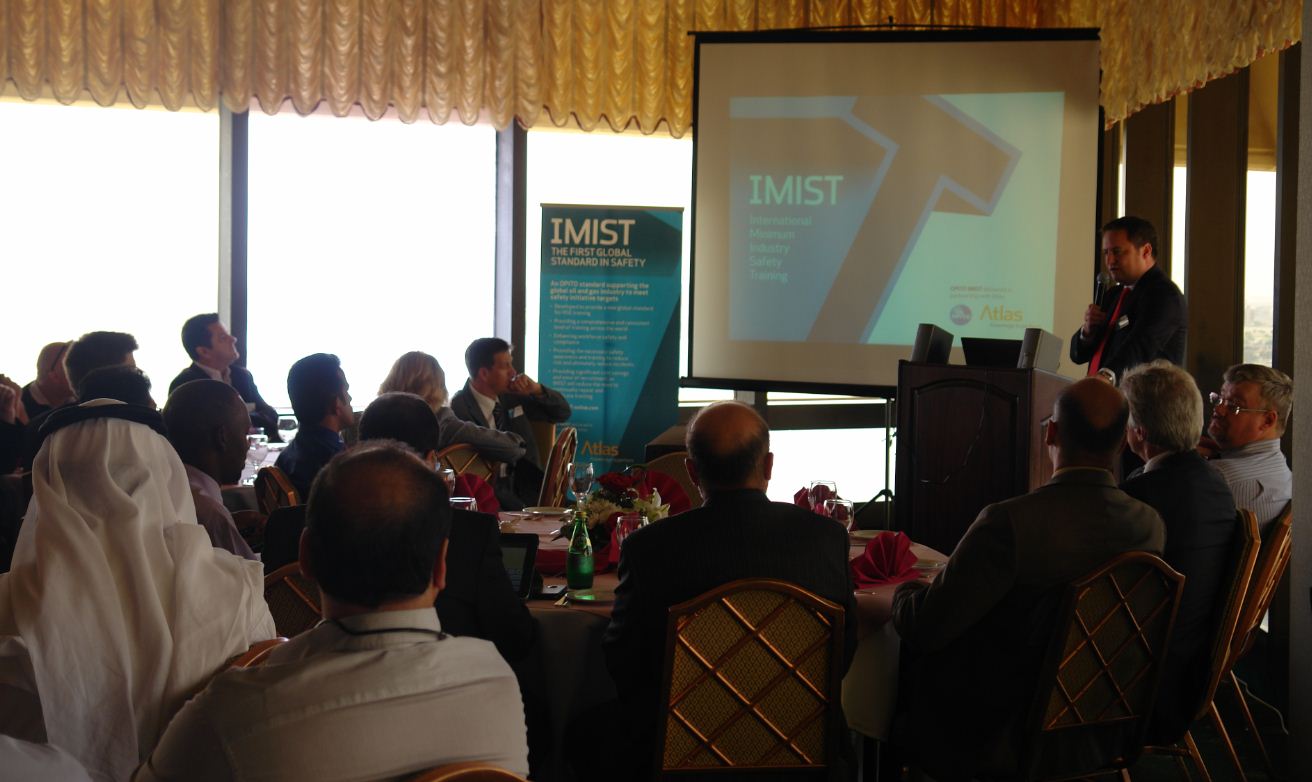






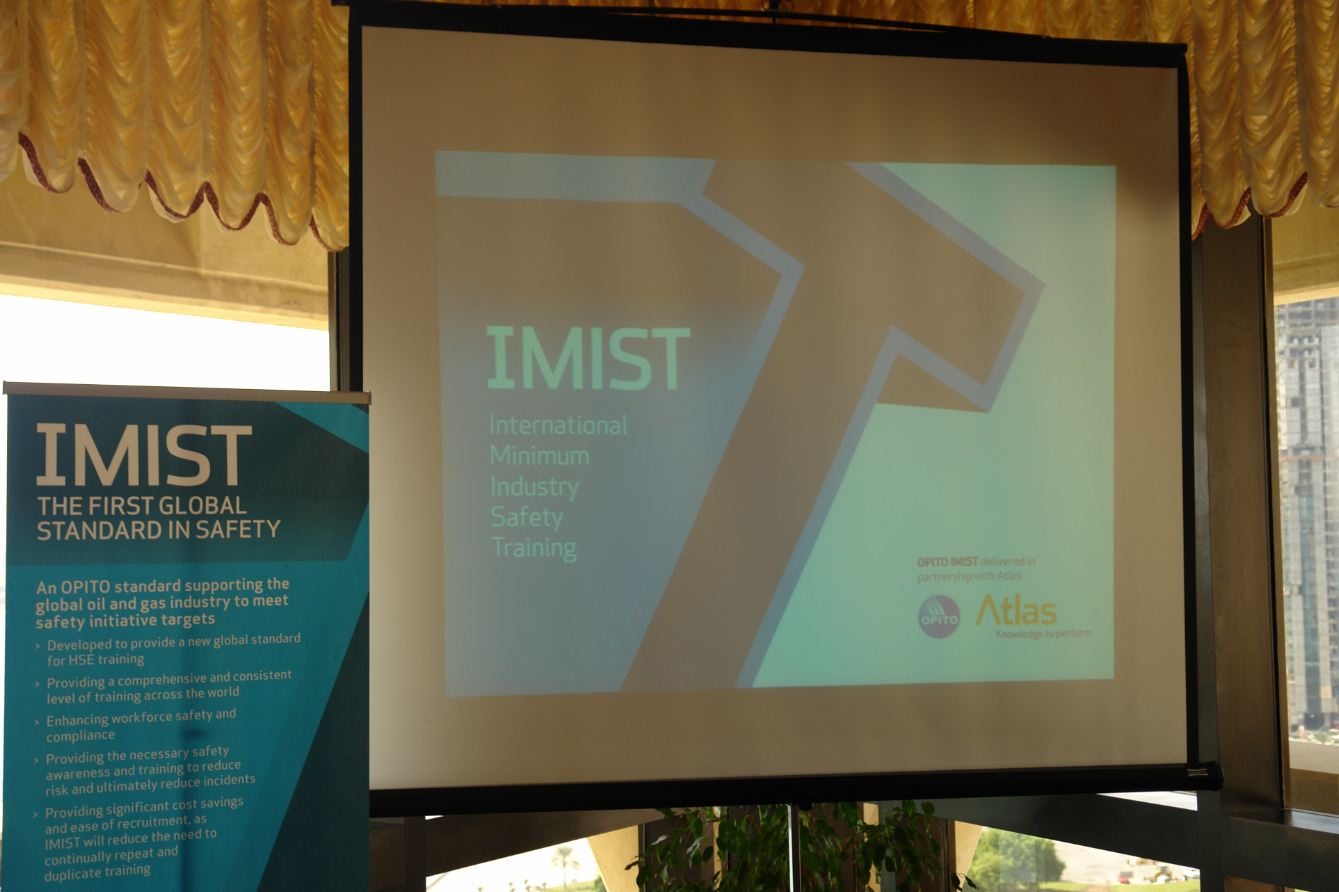

THE global roll-out of the International Minimum Industry Training Standard (IMIST) has reached Qatar. OIL and gas workers in Doha have been some of the first to access a groundbreaking new global training initiative developed to drastically improve safety standards for the global offshore workforce. Around 40 senior representatives from the leading national and international oil companies and training providers in the region attended a briefing at the Sheraton Doha Resort and Convention on October 26th to hear how the International Minimum Industry Training Standard (IMIST) will ensure workers have the necessary safety knowledge and training to understand and avoid hazards and risks. IMIST has been developed by global oil and gas training standards body OPITO International. It brings, for the first time, a standardised level of basic safety training to an estimated 1.5million people employed in exploration and production activities worldwide. Of those, around 460,000 are based in the Middle East. Delivered in partnership with international learning and skills provider Atlas via e-learning, IMIST online will be tailored to meet each region’s specific workforce, language and geographic needs. Ian Laing, managing director of OPITO said: “We were delighted with the attendance at the event in Doha and the positive feedback received from those in the industry. It was an extremely interactive and informative session, revealing that there is a real interest in standardising the safety of this region.” Andy Imrie, director of Atlas said: “IMIST provides the platform for increasing the performance of the national workforce whilst ensuring a standardised playing field in terms of safety and competency. The course is now available in Arabic language, as well as UK and American English and soon to be released in Bahasa Malay. “It has the potential to not only help individual businesses improve their own efficiency, but also the industry overall by enhancing the skills set of the transient workforce, making a significant contribution towards the creation of a safer workplace for all and providing a solid foundation from which to grow further in the future.” IMIST will be rolled out across 30 countries worldwide throughout Asia, Africa and the United States over the next two years.
First global standard in oil and gas safety training launches in Malaysia - September 2011
01/09/2011


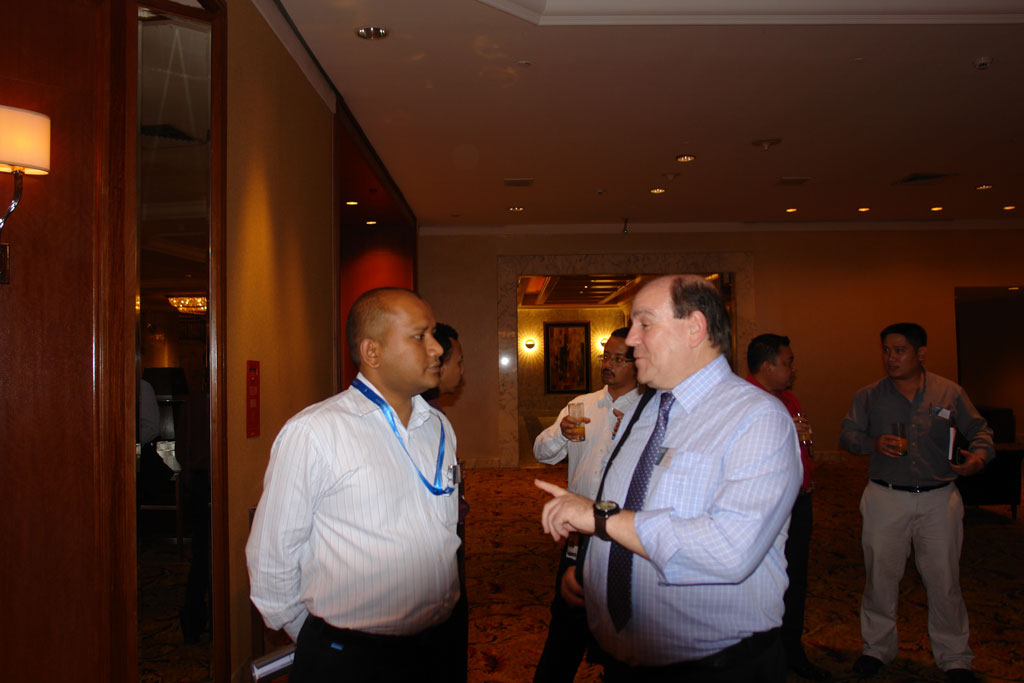
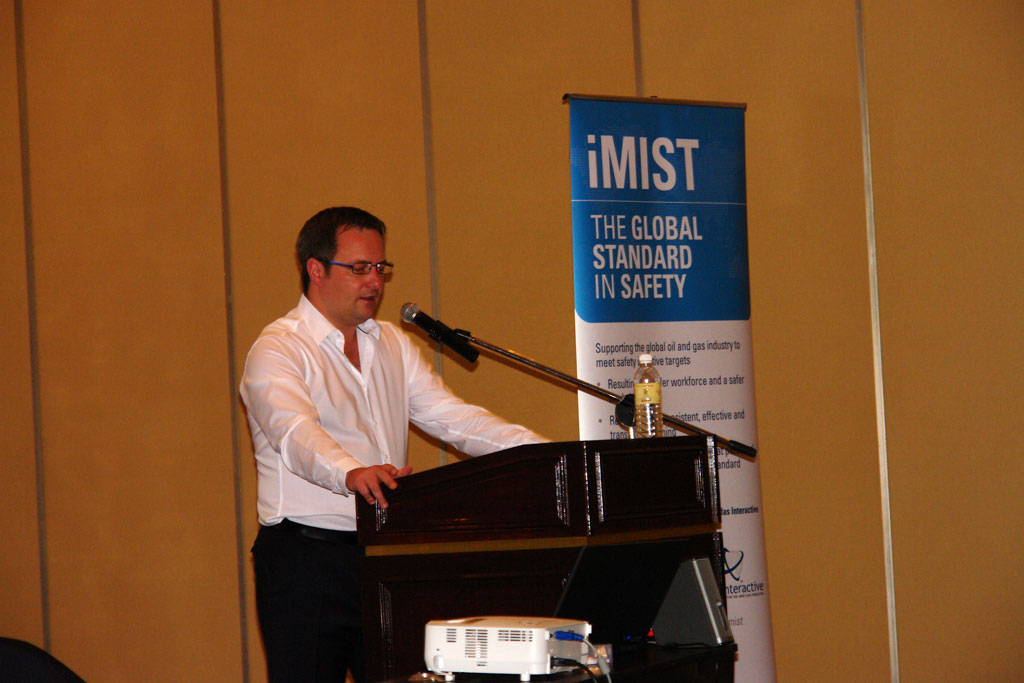
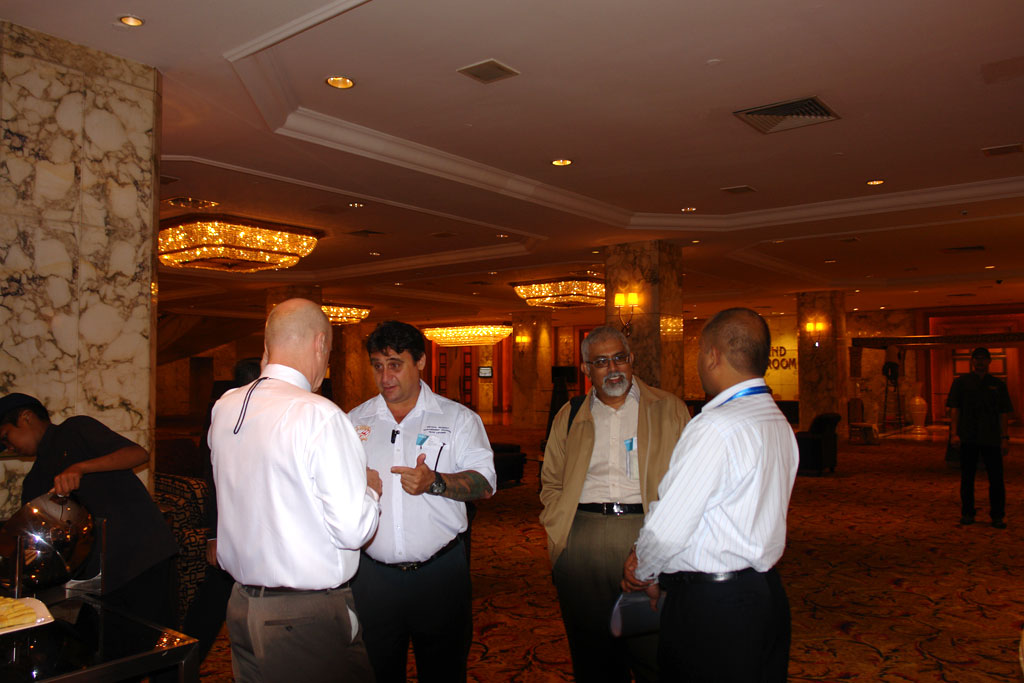
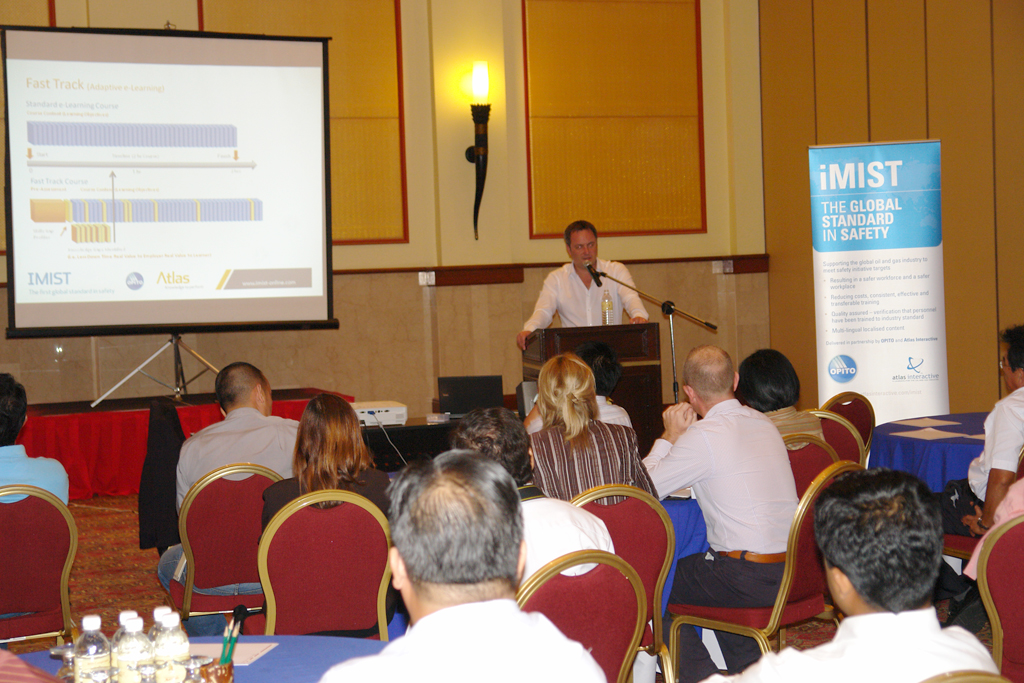

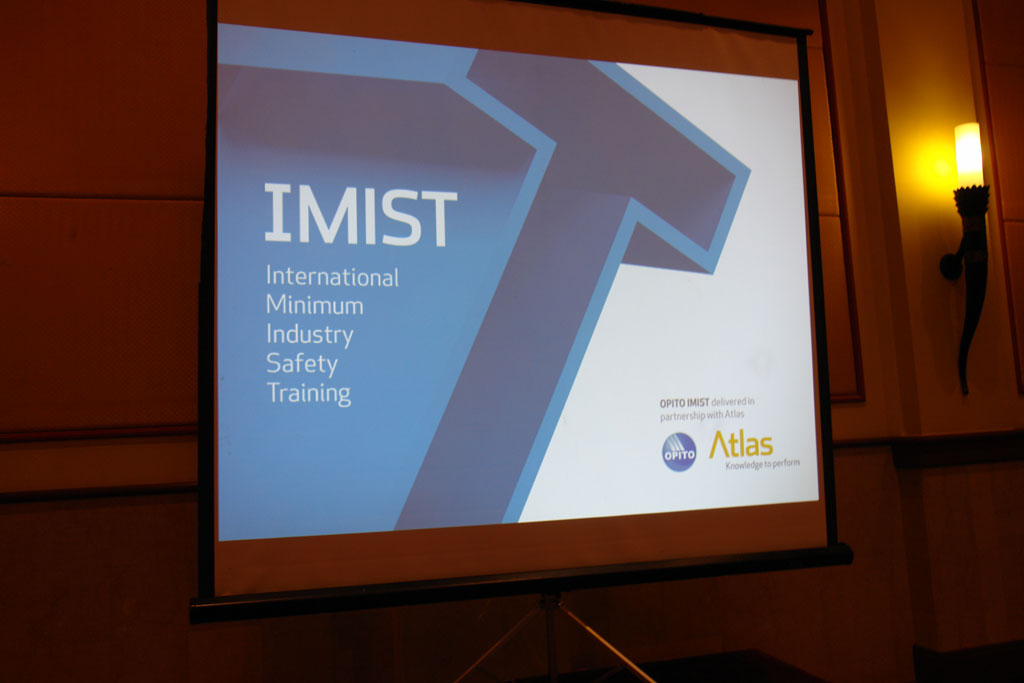
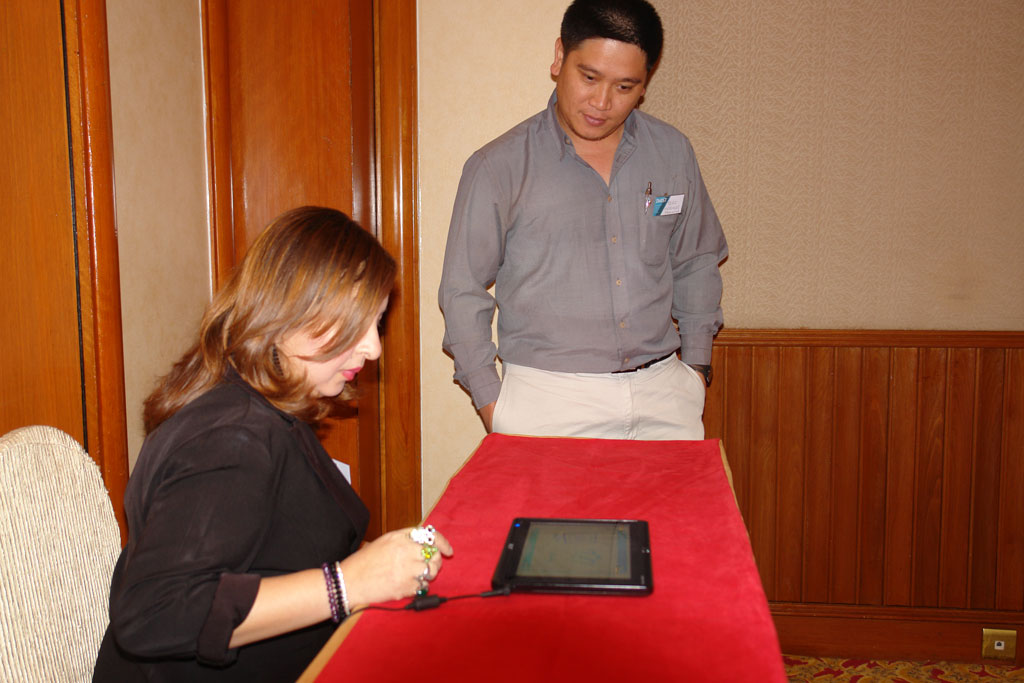
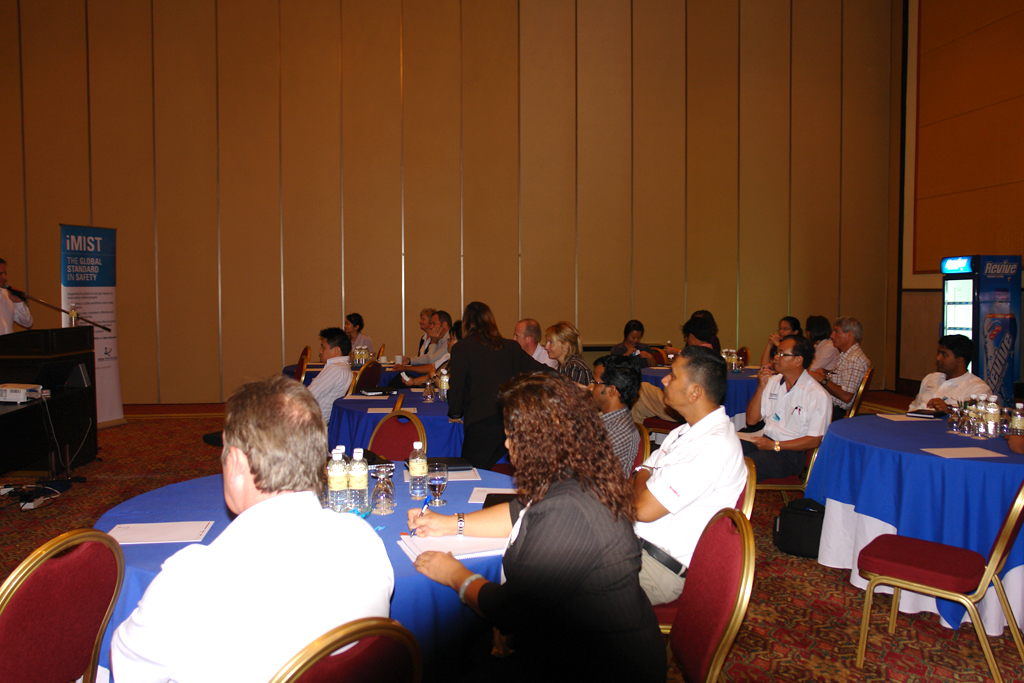

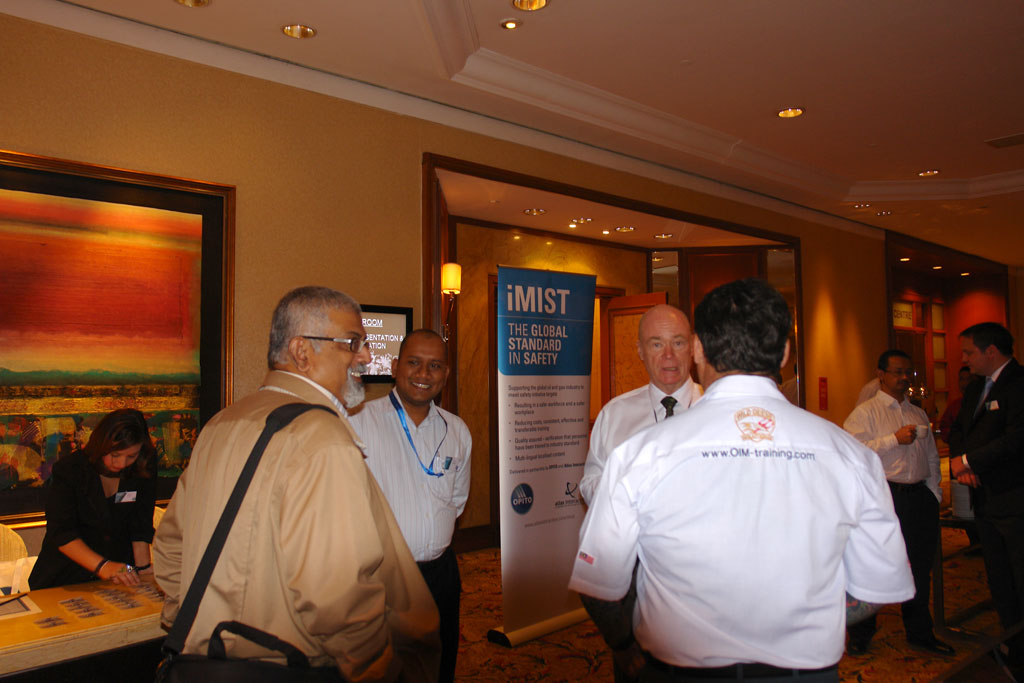
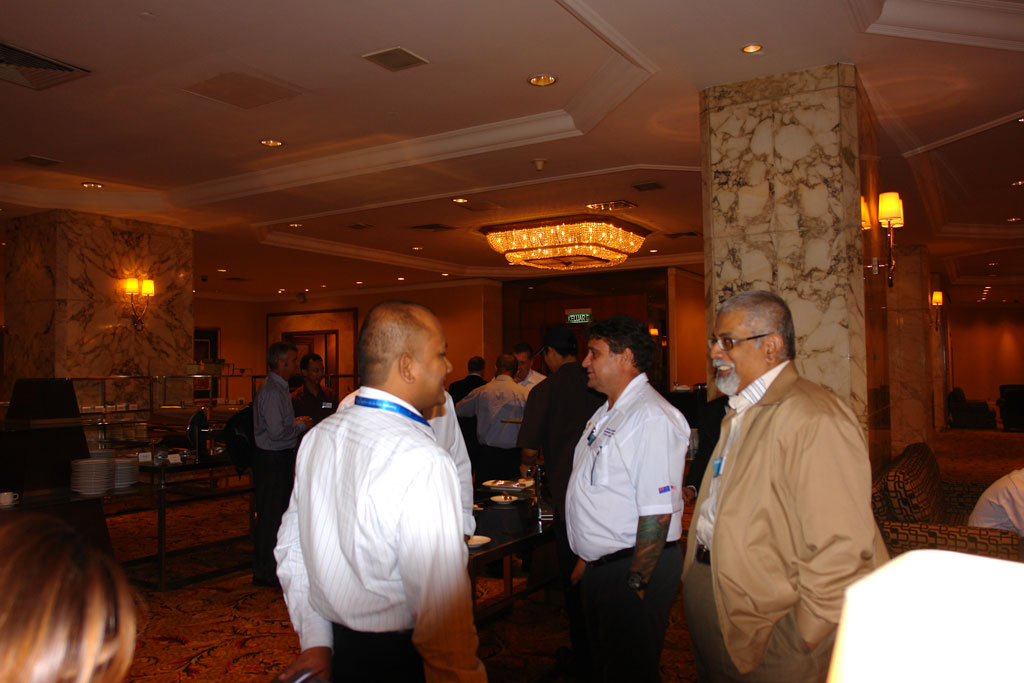
OIL and gas companies in Malaysia will this week get to trial a groundbreaking new global training initiative developed to drastically improve safety standards for the global offshore workforce. Around 80senior representatives from the leading national and international oil companies will attend a series of briefings in Kuala Lumpur and Miri to hear how the International Minimum Industry Training (IMIST) standard will transform the industry by ensuring workers have a common standard of safety knowledge and training to understand and avoid hazards and risks. Launched in the Middle East in July, the events in Malaysia are the next step in a global rollout which will see IMIST introduced across more than 30 countries worldwide over the next two years. IMIST has been developed by global oil and gas training standards body OPITO International. It brings, for the first time, a standardised level of basic safety training to an estimated 1.5million people employed in exploration and production activities worldwide. Of those, around 141,000 are based in the Asia Pacific region. It will be delivered in partnership with international learning and skills provider Atlas via e-learning and tailored to meet each region’s specific workforce, language and geographic needs. “The tragedy that was Macondo has shaken the sector and put the spotlight firmly back on safety and workforce competence. While there is a level of knowledge and good practice within the existing workforce there is a clear desire in the industry for uniformity when it comes to the safety and competency of its people,” said David Doig, OPITO Group chief executive. “To date, delivery and content of basic safety and competency training has varied dramatically from region to region and lacks consistency. In an industry like ours where workers from any number of different companies and nationalities are working side by side, a common approach to training is the only way of striving to ensure that everyone can carry out their job to the same high standard and return home safely at the end of the day. “IMIST sets a new common standard to ensure that everyone, regardless of role or discipline, has the same basic safety understanding. It also addresses the industry’s drive to streamline its efficiency performance by removing the need to continually repeat and duplicate training which is prevalent in the myriad of best intentioned induction and safety programs.” IMIST will be applied to every member of the current workforce and all new entrants to the industry. The course assesses basic safety knowledge in nine subject areas including risk assessment, asset integrity, the use of hazardous substances, working at height and mechanical lifting among other subjects. “We recognise that adopting common industry standards and engaging the essential support to apply them uniformly across the board is a challenge, but there is a real prize out there,” added Doig. “Safety is paramount and the industry has a fundamental duty to make sure that its people are competent and trained to the best possible standards. Training people consistently to the same level will bring significant safety improvements but it is up to each individual company to implement the standards. “At an individual level, every worker should have confidence that their fellow worker has the same level of competence in the hazards and risks in the workplace and how they are best addressed.” OPITO is committed to improving safety and reducing risk for people, assets and companies in one of the most hazardous working environments. The organisation works with Governments, national oil companies, multi-nationals and contractors to provide independent advice and guidance on effective management of workforce skills development, emergency response and occupational standards and qualifications and quality assurance of training delivery. Its world class training network spans 30 countries with more than 200,000 people each year training to OPITO standards. To help employers manage the introduction of IMIST, an innovative and flexible approach to learning and assessment has been taken. This encompasses a two day initial classroom-based course for all new entrants; and an e-learning Minimum Safety Reassessment and Refresher Program for existing workers to demonstrate knowledge of basic safety elements. John Rowley, chief executive officer of Atlas said: “Each country has its own distinct needs and IMIST provides the platform for increasing the performance of the national workforce whilst ensuring a standardised playing field in terms of safety and competency. “It has the potential to not only help individual businesses improve their own efficiency, but also the industry overall by enhancing the skills set of the transient workforce, making a significant contribution towards the creation of a safer workplace for all and providing a solid foundation from which to grow further in the future.” The first briefing will take place today (Monday 19th September) at the Shangri-La Hotel, Kuala Lumpur, from 12-2pm. A second event will take place in Miri, at the Marriott Resort and Spa, Sarawak, on September 21st from 12-2pm.
Oil and gas industry skills body unveils groundbreaking safety initiative - Middle East targeted for IMIST global debut - July 2011
17/07/2011



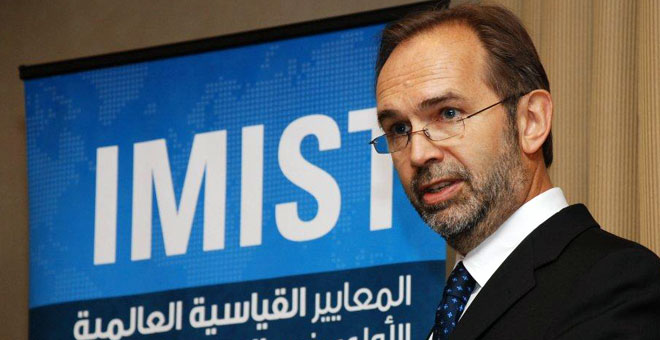
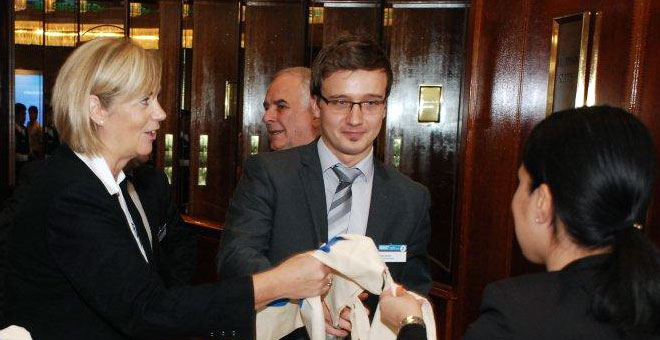




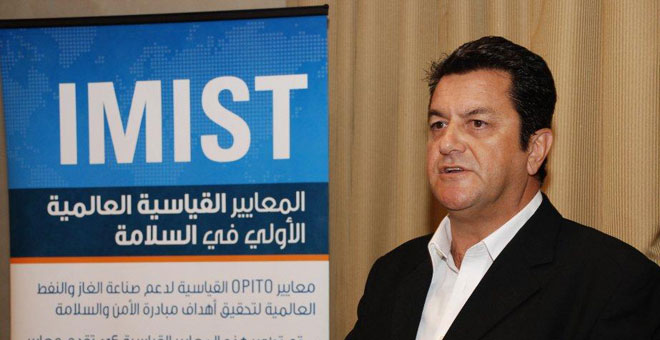



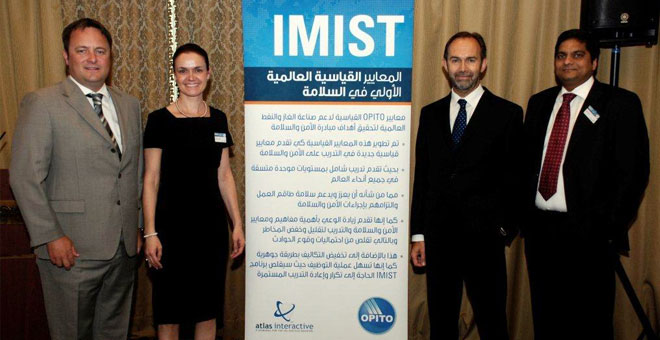



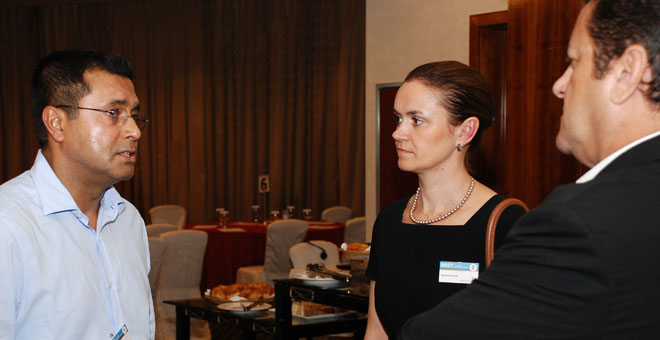
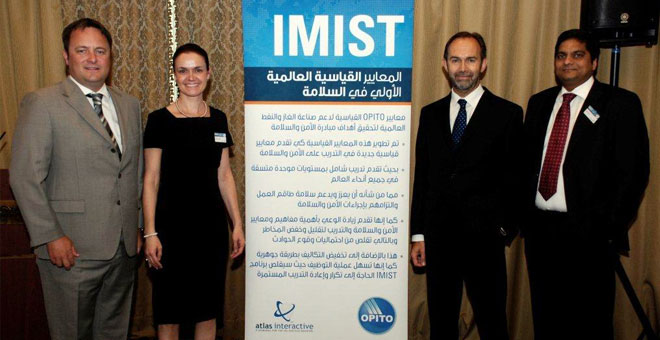
Oil and gas workers in the Middle East will today (July 17) be the first in the world to access a groundbreaking new global training initiative, developed to drastically improve safety standards for the global offshore workforce. More than 100 senior representatives from the leading National and International Oil Companies in the region will attend a series of briefings throughout the week to hear how the International Minimum Industry Training Standard (IMIST) will ensure workers have the necessary safety knowledge and training to understand and avoid hazards and risks. IMIST has been developed by global oil and gas training standards body OPITO International. It brings, for the first time, a standardised level of basic safety training to an estimated 1.5million people employed in exploration and production activities worldwide. Of those, around 460,000 are based in the Middle East. It will be delivered in partnership with international learning and skills provider Atlas Interactive via e-learning and tailored to meet each region’s specific workforce, language and geographic needs. “The tragedy that was Macondo has shaken the sector and put the spotlight firmly back on safety and workforce competence. While there is a level of knowledge and good practice within the existing workforce there is a clear desire in the industry for uniformity when it comes to the safety and competency of its people,” said David Doig, OPITO Group chief executive. “To date, delivery and content of basic safety and competency training has varied dramatically from region to region and lacks consistency. In an industry like ours where workers from any number of different companies and nationalities are working side by side, a common approach to training is the only way of striving to ensure that everyone can carry out their job to the same high standard and return home safely at the end of the day. “IMIST sets a new common standard to ensure that everyone, regardless of role or discipline, has the same basic safety understanding. It also addresses the industry’s drive to streamline its efficiency performance by removing the need to continually repeat and duplicate training which is prevalent in the myriad of best intentioned induction and safety programs.” IMIST will be applied to every member of the current workforce and all new entrants to the industry. The course assesses basic safety knowledge in nine subject areas including Risk Assessment, Asset Integrity, the Use of Hazardous Substances, Working at Height and Mechanical Lifting Activities among other subjects. “We recognise that adopting common industry standards and engaging the essential support to apply them uniformly across industry is a challenge, but there is a real prize out there,” added Doig. “Safety is paramount and the industry has a fundamental duty to make sure that its people are competent and trained to the best possible standards. Training people consistently to the same level will bring significant safety improvements but it is up to each individual company to implement the standards. “At an individual level, every worker should have confidence that their fellow worker has the same level of competence in the hazards and risks in the workplace and how they are best addressed.” OPITO is committed to improving safety and reducing risk for people, assets and companies in one of the most hazardous working environments. The organisation works with Governments, National Oil Companies, Multi-nationals and Contractors to provide independent advice and guidance on effective management of workforce skills development, emergency response and occupational standards and qualifications and quality assurance of training delivery. Its world class training network spans 30 countries with more than 200,000 people each year training to OPITO standards. To help employers manage the introduction of IMIST, an innovative and flexible approach to learning and assessment has been taken. This encompasses a two day initial classroom based course for all new entrants; and an e-learning Minimum Safety Reassessment and Refresher Program for existing workers to demonstrate knowledge of basic safety elements. John Rowley, Chief Executive Officer of Atlas Interactive said: “Each country has its own distinct needs and IMIST provides the platform for increasing the performance of the national workforce, whilst ensuring a standardised playing field in terms of safety and competency. “It has the potential to not only help individual businesses improve their own efficiency, but also the industry overall by enhancing the skills set of the transient workforce, making a significant contribution towards the creation of a safer workplace for all and providing a solid foundation from which to grow further in the future.” Today’s briefing will take place at Le Royal Meridien, Abu Dhabi, from 12-2pm. A second briefing will take place at the Sheraton Doha Resort and Convention Hotel in Doha on July 19. IMIST will be rolled out across 30 countries worldwide throughout Asia, Africa and the United States over the next two years.
OPITO and Atlas Interactive Achieve Significant Milestone in North Sea Oil and Gas Safety Training - June 2011
01/06/2011
OPITO and Atlas Interactive announced today that over half of the UK’s experienced offshore workforce has now taken up MIST, the industry-recognised basic safety training course. Atlas, the Aberdeen-headquartered learning and skills provider, has exceeded 50,000 licences, with over 800 UK oil and gas companies having now embraced OPITO’s UK standard for Minimum Industry Safety Training (MIST) since it was introduced in April 2009. John Rowley, CEO of Atlas Interactive, said: “We are delighted to have reached this milestone helping oil and gas workers in the UK achieve MIST certification. While this represents more than half of the experienced workforce, we continue to receive demand for MIST as employers in the UK Continental Shelf (UKCS) continue to firmly embrace the benefits of having their workforce trained to a common standard. “The innovative technology we developed to implement MIST has proved highly effective in meeting the industry’s needs. Not only is it helping to bring consistency to the industry’s safety training, it is also generating significant savings in terms of the time and money companies spend on this training.” Driven by the industry’s commitment to improve safety, MIST was introduced in the UK in April 2009 and continues to be rolled out across all disciplines of the oil and gas workforce with 47,192 experienced workers having completed the programme to date. Developed by Step Change in Safety and OPITO, it is being supported by industry for the entire UKCS sector to embrace this initiative to increase safety awareness for offshore workers, making MIST one of the most successful safety initiatives deployed in the North Sea. Atlas recently won the contract win to develop and deliver the international version of the programme and IMIST will be launched in the Middle East in July before being rolled out across global oil and gas provinces. David Doig, group chief executive of OPITO, said: “The success of MIST to date in the UK is testament to the continued commitment within the industry towards ensuring the highest possible safety standards among its workforce and provides the industry with a solid platform on which to build its skills base further in the future.” The course contains nine modules including topics like the Risk Assessment Process, Asset Integrity, Use of Hazardous Substances, Working at Height and Mechanical Lifting Activities. Training is undertaken via the internet, saving industry potential downtime and eliminating travel costs. The technology underpinning MIST is Atlas FAST TRACK. An award winning diagnostic tool which works by assessing a learner’s knowledge during a pre-assessment, under time bound conditions. The course is delivered to the learner based on their personal knowledge gaps and use of a process that rebuilds the course size each time based on incorrect responses. This ensures an ultimate pass mark of 100%. This approach has seen days of classroom based content cut down to two hours of e-learning which can be undertaken at any location at any time. The significant difference in the costs shows a return on investment for the industry of approximately £28.7million (GBP) to date.
Clearing the MIST around offshore safety - May 2011
01/05/2011
SAFETY has long been the watchword of the UK Oil and Gas Industry. As technology progresses, hydrocarbon reserves become harder to recover and the industry looks to new geographic markets each with their own challenges to overcome, the focus on safety training has increased. The UK industry, working through OPITO and Step Change in Safety, recognised that a key component to achieving a reduction in offshore hazards and incidents was to improve basic safety training for all personnel. The Minimum Industry Safety Training (MIST) programme was designed to accomplish this, offering standards-based content delivered consistently across the industry and focused on nine subject areas including Risk Assessment, Asset Integrity, Use of Hazardous Substances, Working at Height and Mechanical Lifting Activities among others. The MIST refresher course has now been running since its launch in April 2009 with more than 50,080 experienced offshore workers undergoing assessment and training. It is considered a resounding success for improving offshore safety and for demonstrating the considerable benefits of using e-learning for this type of application. But the road to success has not been without its challenges. As an industry-led scheme, uptake of MIST has not been driven by regulation and with a target population of approximately 50,000 workers from over 700 companies, adopting a standardised approach to health and safety refresher training was always going to be difficult. International learning and skills provider Atlas Interactive was tasked with designing and delivering a cost effective adaptive learning solution which would maximise the effectiveness and compliance of health and safety training for the offshore workforce. “In the past, courses of a similar complexity have been carried out in the classroom over two days, at a typical cost of around £300 per person,” said Atlas’ Chief Executive John Rowley. “Experienced workers had to go through the entire course content, with no account taken of their existing skills base or knowledge of the subject matter which, to them, was both time consuming and uninteresting. “It was vital that in developing the course, we not only helped the UK Offshore Industry meet its safety initiative targets but looked at the perceived barriers which may inhibit its uptake.” Among the key concerns was the sheer logistics of targeting a high volume of existing employees in multiple remote sites each of whom would require access to the system, as well as resistance from existing employees and employers to undertaking 14 hours of training in subjects that many will claim they are already familiar with. Resistance from experienced workers concerned about failing the course and not being permitted to travel offshore with implications on their employment contract was also an issue, along with ensuring that that there is consistency between the training course provided for new employees and the training course for experienced employees. By using an interactive e-learning model, Atlas developed the courseware to be deployed via the Internet, Intranet or, to cater for low bandwidth locations, via CD-ROM with results stored in a central database. The technology underpinning MIST is Atlas FAST TRACK™. A diagnostic tool which works by assessing a learner’s knowledge under time bound conditions. Based on the results of a pre-assessment, FAST TRACK dynamically selects the learning outcomes that are required to satisfy these gaps and rebuilds the course accordingly. “By utilising an iterative process that diagnoses the individual’s knowledge gaps and dynamically personalises the course for each participant, the pass mark can be set at 100% and we can ensure that the workforce has understood all of the topics covered,” said John. “This reduces 14 hours of classroom based content down to approximately two hours of e-learning content. Learners can take the course at any location - home, office or learning centre – at any time, therefore reducing the burden of travel time and associated costs.” Indeed, taking into account the difference in cost between the original classroom based solution, the difference in the costs shows a return on investment for the industry of approximately £28.7million (GBP) to date. To ensure flexibility, workers not currently employed are able to self-register while employers can also purchase blocks of licences for their staff. An integral component of the Atlas MIST solution is the gathering and reporting on course and learner data. This data gives a health check for the industry and the feedback is a key driver for continuous improvement of the system, the assessment and the content. “Significant time and effort was spent ensuring that feedback questionnaire was easy to complete, insightful and could be used for continuous improvement. The form is electronic, making it easier to extract the information and a monthly report is supplied to the industry displaying both the positive and negatives. “It is necessary to understand if there are any usability issues and to ensure that the content meets the required standard for the learners. Evaluation looks at learner demographics, training locations and course content.” Although this initiative is voluntary for organisations to participate, once they have decided it is a requirement for travelling offshore, the information about a worker's successful completion is stored on the Vantage system. Using the demographic data it becomes possible to demonstrate the composition of the North Sea offshore oil and gas sector - analysis of which is informative to the industry at large. It is anticipated that the entire UKCS Oil and Gas Industry will support the initiative to increase safety awareness for experienced offshore workers, making MIST one of the most successful safety initiatives deployed in the North Sea. David Binnie, managing director of OPITO the global skills body behind MIST, said: “The biggest benefit is a safer workforce and ultimately a safer workplace. Supplementary to this is the reduced costs, more consistent, effective and transferable training and a single central, quality assured, verification that personnel that have been trained to the MIST requirements. “Indeed the success of MIST to date in the UK is testament to the continued commitment within the industry towards ensuring the highest possible safety standards among its workforce.” OPITO is delighted to announce that International MIST is currently under development in partnership with Atlas Interactive and will be ready for deployment to the global oil and gas industry this summer. For further information on International MIST contact info@atlasinteractive.com
Atlas wins major multi-million dollar contract to deliver common standard to improve global offshore safety - April 2011
01/04/2011
International learning and skills provider, Atlas Interactive, has been awarded a major contract to develop and deliver new standardised safety training to the global oil and gas industry in a deal which is expected to deliver revenues upwards of $5 million over the first year. Delivered in partnership with OPITO, the skills body which ensures safety and competency in the worldwide Oil and Gas Industry, the agreement will offer Atlas the opportunity to train in excess of 1.5million direct workers in E&P to undertake International Minimum Industry Training Standards (IMIST) over the next two years. This global version of the MIST programme which OPITO and Atlas have successfully piloted with over 48,000 UK oil and gas workers since 2009, is now being developed to standardise safety training for experienced workers in oil and gas provinces around the world. IMIST will be launched in the Middle East in July, then rolled out across 30 countries worldwide throughout Asia, Africa and the United States. It will be delivered via e-learning and tailored to meet each region's specific workforce, language and geographic needs. The contract, which begins this month, supports an aggressive growth strategy for Atlas, which sees this deal as part of a strategic plan to double sales over the next three years. Atlas Chief Executive John Rowley said: “This is a groundbreaking initiative in terms of the importance the industry is placing on health and safety. We are delighted to have been chosen to deliver the IMIST programme, following a competitive tender process, for this global workforce and believe this is a clear indication of the industry's commitment to standardisation and their willingness to embrace new technologies which can create a highly effective and efficient solution. “For Atlas, this agreement will allow us to pursue our ambitious growth strategy in terms of penetration of the international oil and gas market, particularly in the emerging markets where Atlas has already secured some exciting new projects with National and International Oil Companies. The IMIST standard ensures that trainees have the necessary safety awareness and training to avoid risk and ultimately incidents. The course contains nine modules incorporating Safety Observation Systems, Use of Hazardous Substances, Working at Height and Mechanical Lifting Activities. Training is undertaken via the internet and underpinned by Atlas' award winning innovative diagnostic tool called FAST TRACK which works by assessing a learner's knowledge gaps under time-bound conditions. The content of the course that is then delivered to the learner is based on their personal knowledge gaps - saving time by only delivering the training that is required and ensuring 100% competency. This reduces 14 hours of classroom-based content down to approximately two hours of e-learning content. OPITO, which developed the IMIST course, aims to deliver common standards in the global oil and gas workforce that improve safety and competency. The international organisation works with Governments, National Oil Companies, Multi-nationals and Contractors to meet their skills needs to provide independent advice and guidance on effective management of workforce skills development, emergency response and occupational standards, qualifications and quality assurance of training delivery. David Doig, CEO of OPITO Group, said: “The delivery and content of basic safety training varies dramatically from region to region and lacks consistency across the industry. Oil and gas workers should have confidence that their colleagues share the same level of safety training and the ultimate aim of IMIST is to make the working environment safer. “Following a rigorous selection process we are delighted that Atlas Interactive will be developing and delivering the e-learning provision for the experienced worker programme. Their technical expertise, knowledge of the oil and gas business and successful track record has proven invaluable in the development of the high quality safety training package for the industry.” Atlas Interactive, which secured private equity investment from HG Capital in 2007, has reported a highly successful twelve months with its industry-recognised safety training underpinning the scope of its e-learning specialist's capabilities within the oil and gas sector. Founded in 1995, Atlas provides innovative and interactive e-learning courses that deliver accelerated skills development and knowledge transfer to the global Oil and Gas Industry. Over 350,000 people in over 600 companies, across 35 countries and 20 different languages are currently benefiting from the e-learning training provided by Atlas. The company now employs 68 people and is based at Offshore House, Science and Energy Park, Aberdeen, with offices in the Middle East, Asia and the Americas. Test News Title 3
01/03/2011
Test News Content 3 Test News Title 2
01/02/2011
Test News Content 2 EVENTS
20
Nov
2012
Middle East / Abu Dhabi:
3rd OPITO Safety and Competence Conference
IMIST showcasing at 3rd OPITO Safety and Competence Conference in Abu Dhabi Back to the top
30
Apr
2012
Houston:
Offshore Technology Conference in Houston
Atlas is exhibiting at the Offshore Technology Conference in Houston, one of the industry's most foremost events, which takes place on 30th April to 3rd May 2012 Back to the top Back to the top
14
Feb
2012
North America/Houston:
North America/Houston Information Lunch
North America/Houston Information Lunch Back to the top Back to the top Back to the top
22
Nov
2011
Middle East / Abu Dhabi:
OPITO Safety and Competence Conference
IMIST showcased at 2nd OPITO Safety and Competence Conference in Abu Dhabi Back to the top Back to the top
17
Jul
2011
Middle East / Abu Dhabi:
Middle East Information Lunch
Middle East IMIST Information Lunch Back to the top |
Other Recent News
PRESS CONTACTThomas Kennedy |

